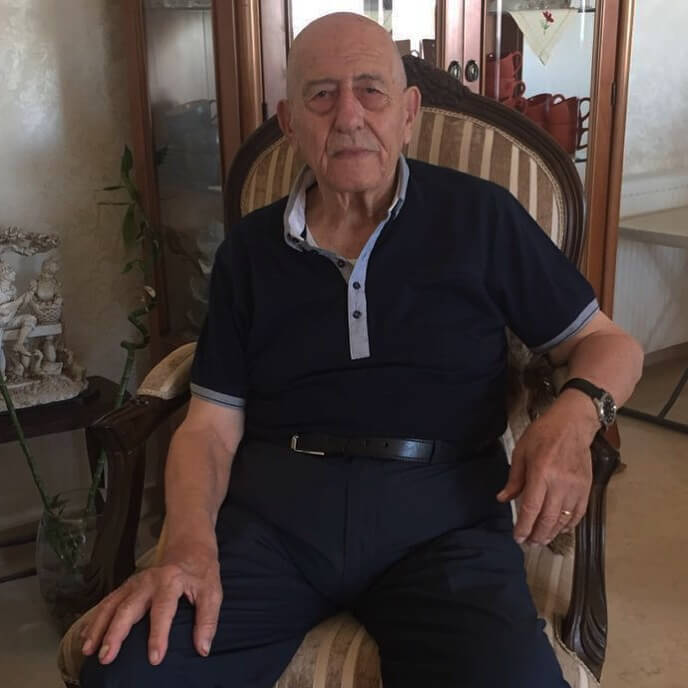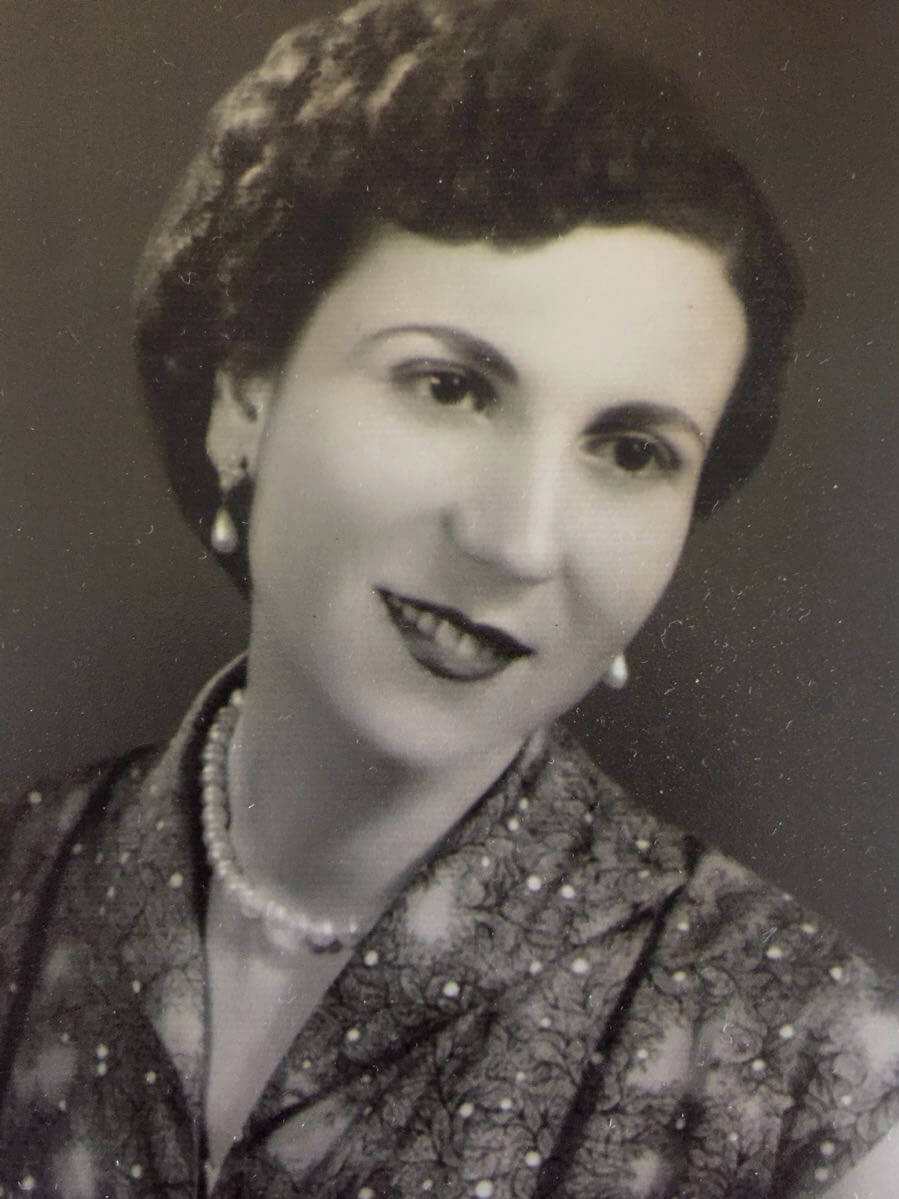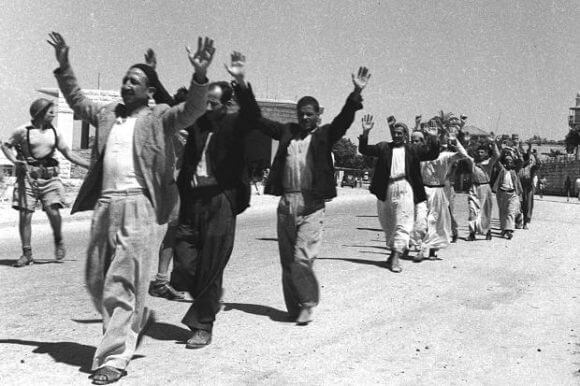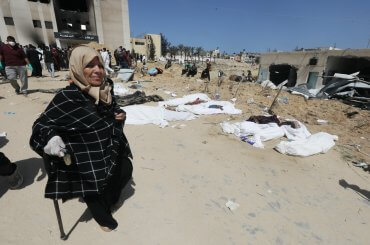My paternal grandparents were expelled from their homeland in the 1948 Palestinian Nakba. Absence has since been embroidered in the fabric of what came to be a family born in a memory of an unattainable land. The distance between home and homeland translated itself in a tense displacement: the income of a Palestinian butcher shop in Jordan, eighteen people living between two rooms, trading a broken tongue for the sake of broken English, existential embarrassment in the name of state-security, passports for breakfast, figs in the afternoon.
The tragedy of the Nakba is that it perpetually reproduces itself with every refugee born in exile and until the last refugee returns. The Palestinian in diaspora gives birth to Nakba; her children become walking embodiments of abandonment.
I recall an image of my father transfixed by the fifty-nine second footage of twelve-year old Muhammad al-Durrah caught between crossfire and dust. That image of my father is the earliest in my memory of a man awaiting his own execution. There was not a single moment when my father was made a refugee, but many unfulfilled executions that personified land in him first, and me in return.
Every conversation my grandparents have is autobiographical. When my grandfather tells his story, he does not look me in the eye. When my grandmother tells hers, she refers to herself in the third person. Performance is eliminated in the room, and every piece of furniture in the house suddenly has an opinion. The disturbance of a smile at the mere utterance of the word “Return” is a foreign invasion that settles in the room like rubble under siege.
The Flight
Leaving a homeland is never pretentious nor calculated. Leaving happens in waves, externally, but performs itself internally first: from city to city to city to border. My great-grandfather, Jaber, rented a house in Birzeit, around sixty kilometers from their home in al-Ramle, located northwest of Jerusalem, so as to leave before the Zionist paramilitary troops arrived. My family refused to leave nonetheless, and when the Zionist air forces dropped bombs on al-Ramle and al-Lod in the summer of 1948, families had to escape with nothing in their hands. My grandfather was of military age and was taken as prisoner. My grandmother escaped on foot all the way to Jerusalem.

Men of military age from al-Ramle and al-Lod took refuge in Deir el-Latin in fear of capture and execution. Zionist forces then called on all male Palestinians between the ages of 16 and 40 years old to come forward in the promise of identification cards that could take them back to their homes. Many like my grandfather were tricked into turning themselves in to the police department. Buses arrived at the scene and thousands of men were taken to Tel Aviv, and later kept hostage in Galilee in the far north.
The hostages were told they were going to be executed, but a British General allegedly stopped the operation under the premise that Palestinian prisoners could later be traded for captured Zionist soldiers. The men were then kept in a besieged camp with no food or water or sleep for days under the desert sun. My grandfather recalls the unbearable heat in the day, and the desert wind at dusk.
A few days later, the Zionist captors pumped underground waterlines with water so hot that my grandfather broke one of his teeth drinking it. Tents and blankets and bread and tomatoes were later brought to them in small quantities; my grandfather remembers sharing two loaves of bread with four other people, a tent with nineteen. After three months had passed, the Palestinian hostages became foreigners in their own lands, never accustomed to the embrace of a refugee tent.
My grandfather later found work in Yaffa that could provide him with basic sustenance, but still living within the confines of the Israeli camp. He recounts these events without looking at me once, “Zionist forces would bring groups of Israeli settlers to watch us work for entertainment.”
But after nine months of our capture, all five thousand of us were traded for five hundred Israelis. We were dropped off a few kilometers from the camp and walked the rest of our way to Ramallah before we were taken to our families with other Palestinian refugees.”
Both my grandparents were transferred to Madaba, Jordan.
The Visit
In 1972, my grandparents visited their home in al-Ramle. Their building had three apartments, and a settler family was living in each one. My grandparents knocked on the door of the first apartment, and the family they found living there was a Moroccan Jewish family. They spoke Arabic. The family received my grandparents with shameful welcome, offering them coffee in their own home. The other apartments were occupied by Iraqi Jews who refused to welcome my grandparents. My grandfather recalls them saying, “Get out of here. We left everything we owned in Iraq as well.” After a while passed, Israeli forces demolished the entire building so that no one would reclaim it.

“We own an eighty dunam citrus plantation in al-Ramle. I saw it again in the year of 1972; the trees were as they once were, but there was no one to water the land. The government had installed water sprinklers instead and closed the water well. We later got news that our home was demolished, and learned that all the citrus trees were uprooted and replaced with a military camp operating for IDF forces.”
On their four-day trip, my grandparents visited a small village north of al-Ramle called Nabi Saleh, known for its nonviolent demonstration today.
“I knew an olive tree field that I wanted to see again. I knew it well. Upon my arrival, I saw foreign, tall buildings. Twenty levels perhaps. The buildings were erect on long columns with parking lots and shelters under each of them. Across the field there were parks and swimming pools and gardens, something out of the ordinary. A field I once walked through among the Roman olive trees thousands of years old, now looked like a European capital. All forty dunams of olives and cactuses was uprooted.”
My grandmother recalls two natural springs in the field. A pit in the ground that always self-reproduced water from its natural well. The water came out cold from the ground; the temperature of the earth would reach the forties and the fifties, but the water always remained cold. She said the olive trees were so big and old that they provided shade for over twenty people at once.
My grandparents spoke of olives and oranges and cities and wells and land for years, and I was shamed to the bone before them, making promises in the name of a Palestine I have seen only in such embarrassment before absence. This embarrassment expressed itself through generations reminding each other where they come from, prospering on foreign land. Glory despite degradation and presence despite absence.
Editor’s Note: We are extremely excited to announce that Tamara Nassar is interning with Mondoweiss over the summer. If you’re a student and interested in interning with us during the 2016-17 school year, please get in touch at contact@mondoweiss.net.



Tamara, words don’t suffice — thank you.
thank you
tragedies all around… my uncle was killed by Egypt air force over Tel Aviv in ’48… friends dead in ’56, ’67, ’73 wars… terrible…
we need peace under UN 242… period.
The act of denial by zionists was already described in painful accuracy in 1949:
“ To be knowingly led astray and join great general mass of liars – that mass compounded of crass ignorance, utilitarian indifference, and shameless self-interest – and to exchange a single great truth for a cynical shrug of a hardened sinner.” –S.Yizhar, novelist, in his book “Khirbet Khizeh” (1949). Excerpt from Professor Oren Yiftachel, Geography Department, Ben-Gurion University. in his Forward to Noga Kadman’s “Erased from Space and Consciousness.”
It is in the stories that we connect, learn and remember. The shame of what the world has allowed to be done to the Palestinians belongs to all of us.